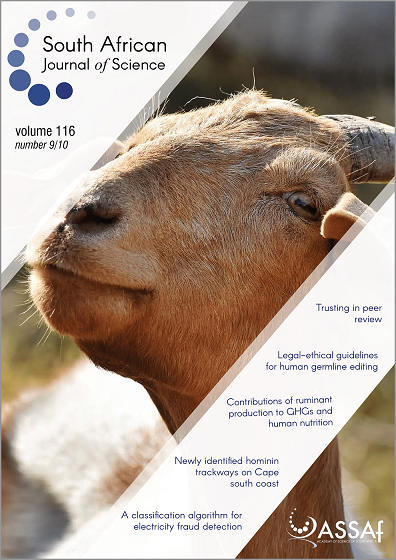A balanced perspective on the importance of extensive ruminant production for human nutrition and livelihoods and its contribution to greenhouse gas emissions
DOI:
https://doi.org/10.17159/sajs.2020/8192Keywords:
animal source foods, cognitive development, livestock, greenhouse gases, nutritionAbstract
There is a general perception that ruminants produce large quantities of greenhouse gases which contribute to global warming. Sometimes percentages are quoted out of context. For example, the percentage quoted for developed countries indicates the greenhouse gas contribution from livestock is less than 6%, while that for developing countries is 40–50%. However, the reason for this relatively low contribution from developed countries is because of very high contributions from other sectors. Ruminant production also is in the spotlight as it is the world’s largest user of land and South Africa is no exception. Only ruminants can utilise areas of non-arable land where the vegetation is rich in fibre and convert this fibre into high-quality nutrients for human consumption. Foods from animal sources (including ruminants) are essential for the human diet, as they support early childhood and cognitive development. Many rural households depend on ruminants and these animals are central to the livelihoods and well-being of these communities. The negative effects of red meat on human health and the negative environmental impact of livestock production are overemphasised, while the higher bioavailability of nutrients from livestock source foods, which stimulates mental and cognitive development compared to vegetarian or grain based foods, is ignored. Here we estimate that livestock are responsible for only 4% of the world’s greenhouse gases through methane production. We also highlight that if the high fibre vegetation is not utilised by livestock, it will still produce greenhouse gases through burning or rotting, without any benefit to humans. Livestock source foods are important if global nutritional, educational and economic needs are to be met; and this message should be conveyed to the public.
Significance:
- We propose that a balanced message should be conveyed to the broader scientific community and the public on the role of livestock in meeting global nutritional needs and contributing to global warming.
- Livestock source foods are important if the global nutritional, educational and economic needs are to be met and can be used to feed developing countries out of poverty.
Published
Issue
Section
License

All articles are published under a Creative Commons Attribution 4.0 International Licence
Copyright is retained by the authors. Readers are welcome to reproduce, share and adapt the content without permission provided the source is attributed.
Disclaimer: The publisher and editors accept no responsibility for statements made by the authors
How to Cite
- Abstract 1711
- PDF 1023
- EPUB 187
- XML 370












.png)